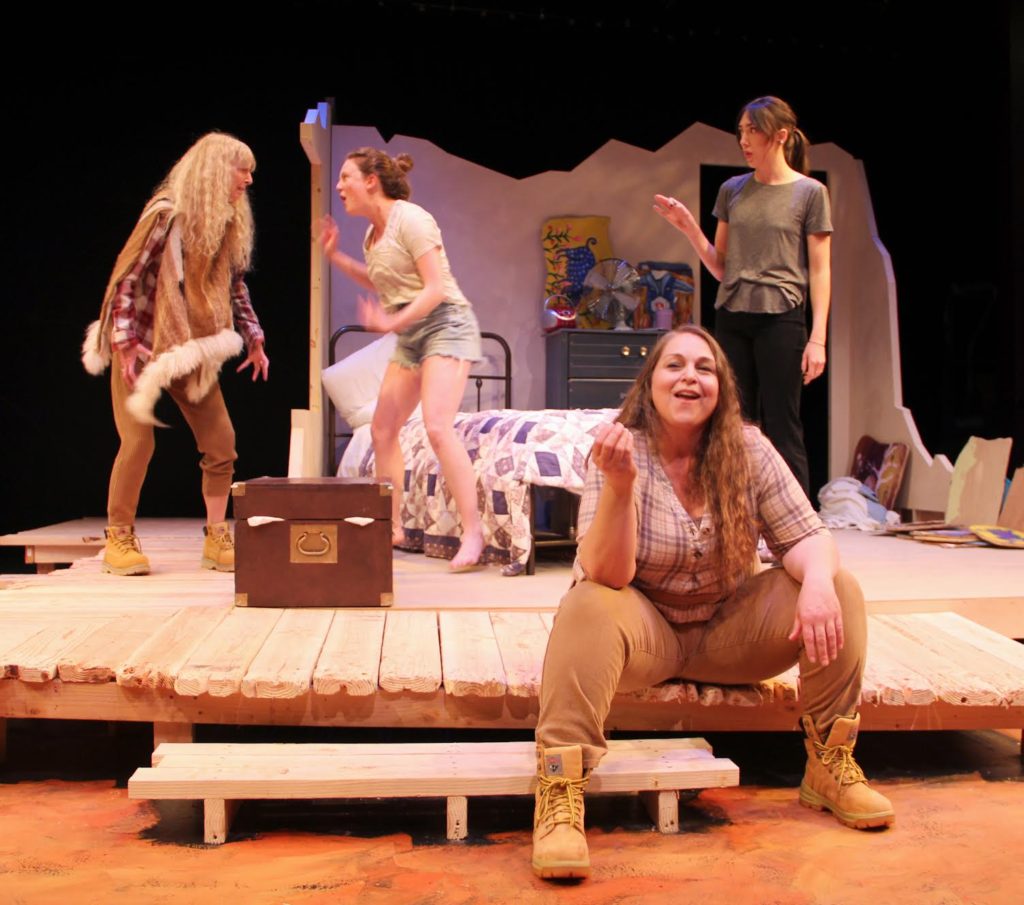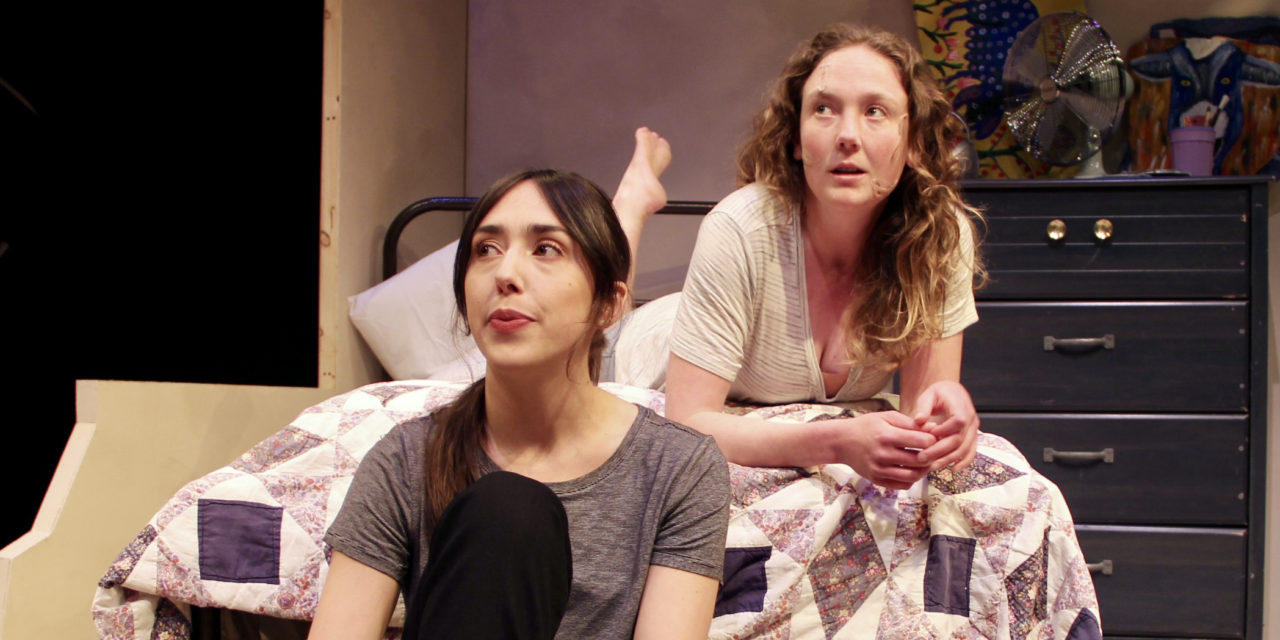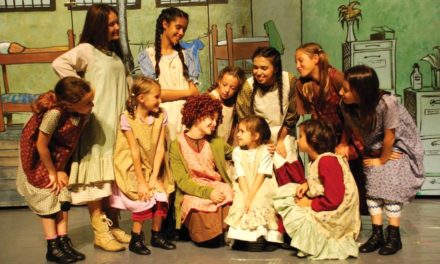(Above: Willow Jade Norton directs Audrey Cefaly’s play, Alabaster, at Oregon Contemporary Theatre. The cast includes Jerilyn Armstrong (left) and Hailey Henderson.)
By Randi Bjornstad
It’s odd how things sometimes work out. Willow Jade Norton, who is directing a play called Alabaster at the Oregon Contemporary Theatre, says the production originally was in the works several years ago, having been chosen to become one of the National New Play Network’s “rolling world premieres.”
“Everything was in process, and the sequence of theaters — including OCT — was set,” Norton said.
The way it works, playwrights with promising new plays can apply to be part of the Rolling World Premiere (or RWP) program if three participating local theater organizations agree to put the play on stage during a 12-month period.
The playwright then has a chance to hone the script and adjust the mechanics of scenery, lighting, timing, and other critical elements based on what is learned from each of the RWP locations.
So far, the National New Play Network has assisted with the production of at least 90 such plays, contributing more than $1 million in financial support to make the productions possible.
Alabaster, Norton said, is unusual in several ways. First of all, way more than three regional or community theaters clamored to do playwright Audrey Cefaly’s play, “and that is huge honor in itself,” Norton said.
In fact, 11 theater companies signed on to present Alabaster, and by 2019 the first several had been performed before the pandemic interfered and the rest of the runs, including the one at Oregon Contemporary Theatre — the final stop on the original list — had to be postponed.
But in the spirit of all’s well that ends well, Norton believes that producing Alabaster now has more impact than it would have had two years ago.
“It’s all about timing, and what goes on in this play seems to have been created for this moment now, more culturally and politically,” she said. “It’s about being seen, about all beings being seen.”
That extends particularly to women and the way they are caught in a crossfire of turmoil now, Norton believes.
“There is so much conflict and so much of different groups fighting over power,” she said. “And much of that centers around women, and politics, and the Supreme Court and the movement to affect the rights of women to their own bodies and to be honored as intelligent and multi-faceted, not judged on appearance or the expectations of men.”
Norton admits she gets “choked up” just talking about these issues. “Society as a whole has been experiencing so much trauma,” she said. “We can’t go back to the selves we were before, but we actually can find peace and hope even in the face of trauma, if we let go and recognize —and respect — the beauty and capability in ourselves and others.”
Here’s a synopsis of Audrey Cefaly’s Alabaster:
Alabaster is about an artist who lost her entire family (and nearly died herself) in an Alabama tornado. Three years since the devastation, June has isolated herself, along with her goats Weezy and Bib, on what remains of her family farm. June, who suffers from agoraphobia and crippling PTSD, is covered, from head to toe, with scars. She gets up every day and feeds the goats, weeds the garden, and picks up her paintbrush.
Alice, a world-renowned photographer, has come to take pictures of June for a series on women with scars. But Alice, a lesbian photographer from New York, is carrying scars of her own and is desperately trying to outrun her own pain. The sexual tension between June and Alice is immediate and ever-present.
But what they need from each other transcends the physical. What does it mean to be truly “seen?” How do we pick up the pieces? How do we move forward? A play about women. About art. About healing.
But Norton cautions that while deep, “This play is also hilarious, really funny. Life is really funny, and there are many places in this play to laugh.”
In fact, because of the gravity and pace of the show, “the playwright has written in moments throughout the play where the actors all breathe,” she said. “And that makes the audience breathe, too. Those moments of breath are a gift to the audience.”
Because of the tension of the subject matter, Cefaly “has layered in comedy, joy, and silliness,” Norton said. “It’s so intentional — every comment, every explanation, has rhythm.”
The play also has interesting surprises, such as the fact that Weezy the goat is the narrator.
“She is an all-seeing instrument of the divine — she acknowledges the audience and helps them get through moments and life,” Norton said. “It’s kind of like this is its own world, its own realm — like Tolkien’s or C.S. Lewis’ worlds in their books —and each world has its own rules.”
In a couple of cases, Norton asked — and was granted — permission to make some rules of her own as she directed the play.
The play originally was written for four characters, and Norton asked and received permission to add a fifth, in the form of a musician, “a part of the spiritual landscape,” she said.
“There are many different sounds in this play — animals, birds, insects — and it made me think of a musician creating them all in different ways. So I asked Audrey (Cefaly), and at first they were hesitant, but they trusted me and said ‘yes,’ and they have been 110 percent supportive. And doing this really has helped to shape our play.”
Another departure from the original script includes a voice-over created by Norton’s 7-year-old daughter, Brice, as part of a flashback the main character, June, experiences about the tornado, in which her younger sister, Amy, died.
“Having Amy’s voice wasn’t part of the script — it had June quoting Amy — but I thought it would add something, and the sound designer said, ‘How about your kid?’ So I asked Brice, and she wanted to do it. She is not in the play — this is much too adult — but I think having the child’s voice is important.”
Another member of the family, Norton’s mother, Marla Norton, is also in the cast.
“My mom has auditioned for several plays I’ve been involved with, but it’s never been the right role before,” she said. “This one really is.”
Norton calls Alabaster, which actually is a city in Alabama where the play is set, as well as the playwright’s home state, “a real gem” of a play.
“This is an important play about experiencing trauma and then breathing through it and being able to let it go,” she said. “I am honored to have been able to have a part in bringing this together — I think magical things have happened.”
The cast of Alabaster includes veteran OCT actors Jerilyn Armstrong, Hailey Henderson, and Marla Norton, with introductory appearances by Kamden Flowers and Rose Heising.
Norton credits dramaturg Carolyn Messina with an essential role in bringing Alabaster to the stage. The OCT production crew includes assistant director Jennifer Chaney, with lighting by Emily Bolivar, costumes by Erin Wills, scenic design by Amy Dunn, projection and sound by Ryan Rusby, and makeup by Gina Love. Colleen Rooney is production stage manager, with Riley Allen as assistant stage manager and properties manager.
Albaster at Oregon Contemporary Theatre
When: 7:30 p.m. on May 20-21, May 26-28, June 2-4; 2 p.m. matinees on May 29 and June 5; streaming available on demand through June 5
Where: Oregon Contemporary Theatre, 194 W. Broadway, Eugene
Tickets: $20-$44 in-person performances; $20 for streaming online, available through the box office at octheatre.org or 541-465-1506

Characters in Alabaster, clockwise from left, are Marla Norton, Hailey Henderson, Jerilyn Armstrong & Kamden Flowers; Willow Jade Norton directs the show at Oregon Contemporary Theatre.












